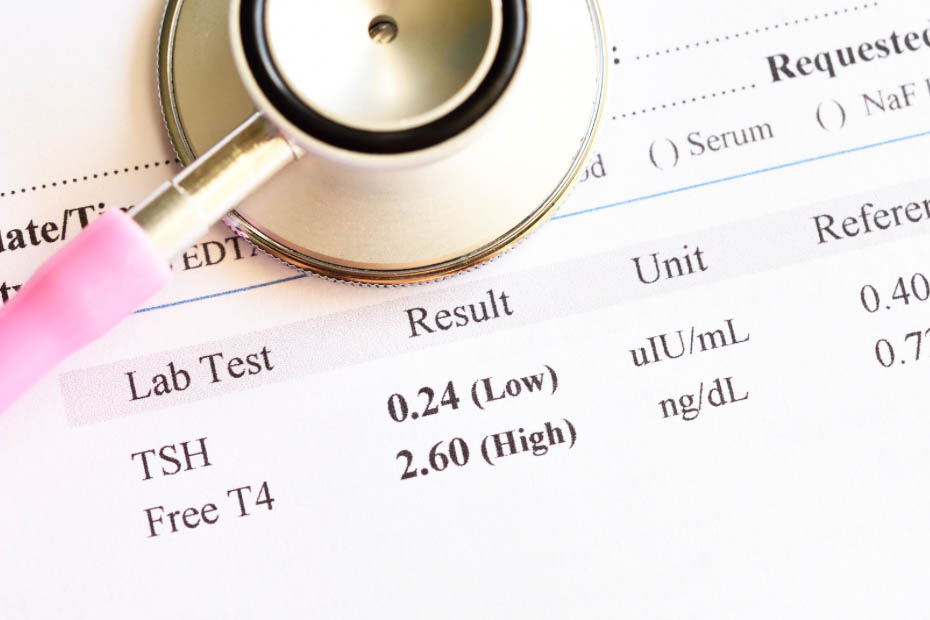Despite it being a small gland in the neck, the thyroid has a huge role in regulating your body’s metabolism through hormone production.
Any disturbance to its function can cause health problems.
In this article, we’ll look into common thyroid conditions and their symptoms, as well as the tests to diagnose them.
What are thyroid conditions?
Normal thyroid function
The thyroid produces hormones that regulate the following:
- Metabolic rate
- Heart
- Digestion
- Muscle control
- Brain development
There are three essential hormones that are involved in regulating thyroid function:
- Thyroid-Stimulating Hormone (TSH)
TSH is produced by the pituitary gland to stimulate the thyroid gland to produce and release thyroid hormones. The pituitary gland adjusts how much TSH it releases based on what your body needs.
- Triiodothyronine (T3)
T3 is one of the two main thyroid hormones produced by the thyroid gland. It’s the active form of thyroid hormone that affects the body’s metabolism, energy production, heart rate and other essential functions. T3 is more potent than the other thyroid hormone, T4, but it is produced in smaller quantities.
- Thyroxine (T4)
T4 is the other main thyroid hormone produced by the thyroid gland. It serves as a precursor to T3, meaning that the body converts T4 into T3 in various tissues. T4 is produced in larger quantities compared to T3, but it’s considered a less active form of the hormone.
In a healthy person, the optimal hormone range looks like this:
- TSH:4 to 4.0 mIU/L
- Total T3: 80 to 200 ng/dL
- Total T4:5 to 12.0 μg/dL
When there’s an imbalance in these ranges, you may develop thyroid disorders.

Here are the most common ones.
Hypothyroidism
Hypothyroidism happens when there’s insufficient thyroid hormone production.
Symptoms include:
- Fatigue
- Weight gain
- Constipation
- Dry skin
- Depression
A mild form of hypothyroidism, subclinical hypothyroidism, refers to a condition where the thyroid gland isn’t producing enough thyroid hormone to maintain optimal function. In this case, TSH levels may be elevated, but T4 levels are within the normal range.
Hyperthyroidism
Opposite to hypothyroidism, hyperthyroidism is excessive thyroid hormone production.
Symptoms of this condition include:
- Weight loss
- Increased heart rate
- Sweating
- Anxiety
A milder form of hyperthyroidism where the thyroid gland produces excessive amounts of thyroid hormone, but the symptoms aren’t as pronounced as in overt hyperthyroidism, is called subclinical hyperthyroidism.
Those who have this condition may not experience noticeable symptoms, but they’re at risk for complications, such as:
- Osteoporosis
- Atrial fibrillation
- Cardiac dysfunction
Thyroiditis
Thyroiditis happens when the thyroid gland is inflamed and becomes overactive (hyperthyroidism) or underactive (hypothyroidism).
Different types of thyroiditis include:
- Hashimoto’s thyroiditis: An autoimmune condition where the immune system attacks the thyroid gland, leading to gradual damage and hypothyroidism
- Subacute thyroiditis: An acute, painful inflammation of the thyroid, often triggered by a viral infection
- Postpartum thyroiditis: Occurs in some women after giving birth, with phases of hyperthyroidism followed by hypothyroidism
- Silent thyroiditis: A painless inflammation of the thyroid that can lead to transient hyperthyroidism
- Riedel’s thyroiditis: A rare form where fibrous tissue infiltrates the thyroid, causing enlargement and hardening of the gland
- Acute suppurative thyroiditis: An extremely rare and severe form caused by a bacterial infection that leads to the formation of pus within the thyroid gland
Thyroid nodules
Thyroid nodules are often noncancerous bumps in the thyroid gland. Many people have them unknowingly, so we recommend that you do regular monitoring and identification of abnormal nodules.
Thyroid cancer
Thyroid cancer is a malignant transformation of thyroid cells.
Though the number of cases is increasing, the treatment for this type of cancer is generally successful. In the United States, the 5-year relative survival rate is 98%.
Symptoms may be absent until the disease advances, but when present, they include:
- Neck lump
- Difficulty breathing or swallowing
- Voice changes
- Persistent cough
How are thyroid conditions diagnosed?
There are different ways to diagnose thyroid conditions. Depending on the severity, your healthcare provider may ask you to take more tests.
The most common ones include:
- Thyroid function tests
- Thyroid-stimulating hormone (TSH) test
- Free thyroxine (FT4) test
- Triiodothyronine (T3) test
- Clinical evaluation
- Imaging studies
- Ultrasound
- Computed tomography (CT) scan
- Magnetic resonance imaging (MRI)
- Positron emission tomography (PET) scan
- Thyroid biopsy
Key takeaway
Understanding thyroid disorders is important so you can detect the symptoms if they happen.
Always consult a healthcare professional for personalized advice and guidance regarding thyroid-related concerns.




















































